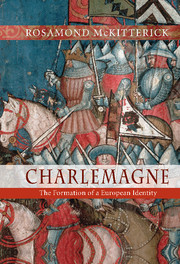Book contents
- Frontmatter
- Dedication
- Contents
- List of maps
- List of tables
- Preface
- List of abbreviations
- 1 Representations of Charlemagne
- 2 Pippinids, Arnulfings and Agilolfings: the creation of a dynasty
- 3 The royal court
- 4 The king and the kingdom: communications and identities
- 5 Correctio, knowledge and power
- Bibliography
- Index of manuscripts
- General index
4 - The king and the kingdom: communications and identities
Published online by Cambridge University Press: 05 August 2015
- Frontmatter
- Dedication
- Contents
- List of maps
- List of tables
- Preface
- List of abbreviations
- 1 Representations of Charlemagne
- 2 Pippinids, Arnulfings and Agilolfings: the creation of a dynasty
- 3 The royal court
- 4 The king and the kingdom: communications and identities
- 5 Correctio, knowledge and power
- Bibliography
- Index of manuscripts
- General index
Summary
INTRODUCTION
In the course of his reign, as the Frankish realm became ever larger and more disparate in character, so royal government became less dependent on the king's own movements. Charlemagne's accessibility in person, as we established in the preceding chapter, was not the key issue, though from the beginning of his reign he insisted that any man in his kingdom had the right to come to him. Instead, he increasingly relied on the effectiveness of his officials and, above all, on his ability to communicate with them. This can best be observed in the development of the roles of the assemblies, of the capitularies as the principal means of communicating with his people, and of the missi dominici, officials drawn from the church and the higher ranks of the laity. All these were part of establishing order in a regnum where ecclesiastical and secular concerns were intertwined and interdependent; bringing thieves to justice and combating heresy were equally matters of state. Government of the realm as a whole was complemented by measures designed for particular regions. The assemblies, capitularies and role of the missi dominici, therefore, will be the focus of the first sections of this chapter. Yet underlying the processes of communication was a strong purpose, not simply to ensure royal control, peace, stability and order, but also to create a harmonious and Christian whole of a disparate realm. Some of the means by which Charlemagne attempted this, and articulated it with ever greater insistence, will also be explored. The establishment of new churches and monasteries, and the conversion of conquered peoples, most obviously the Saxons, were integral components of Frankish political expansion. The Christian faith offered an essential common culture to bind this huge empire together, however varied the liturgical practice and religious expression might have been. The organization of ecclesiastical institutions, the observance of the faith in ritual, the promotion of Christian morality, the definition of orthodox doctrine, and the dissemination of essential texts were all part of this.
- Type
- Chapter
- Information
- CharlemagneThe Formation of a European Identity, pp. 214 - 291Publisher: Cambridge University PressPrint publication year: 2008



